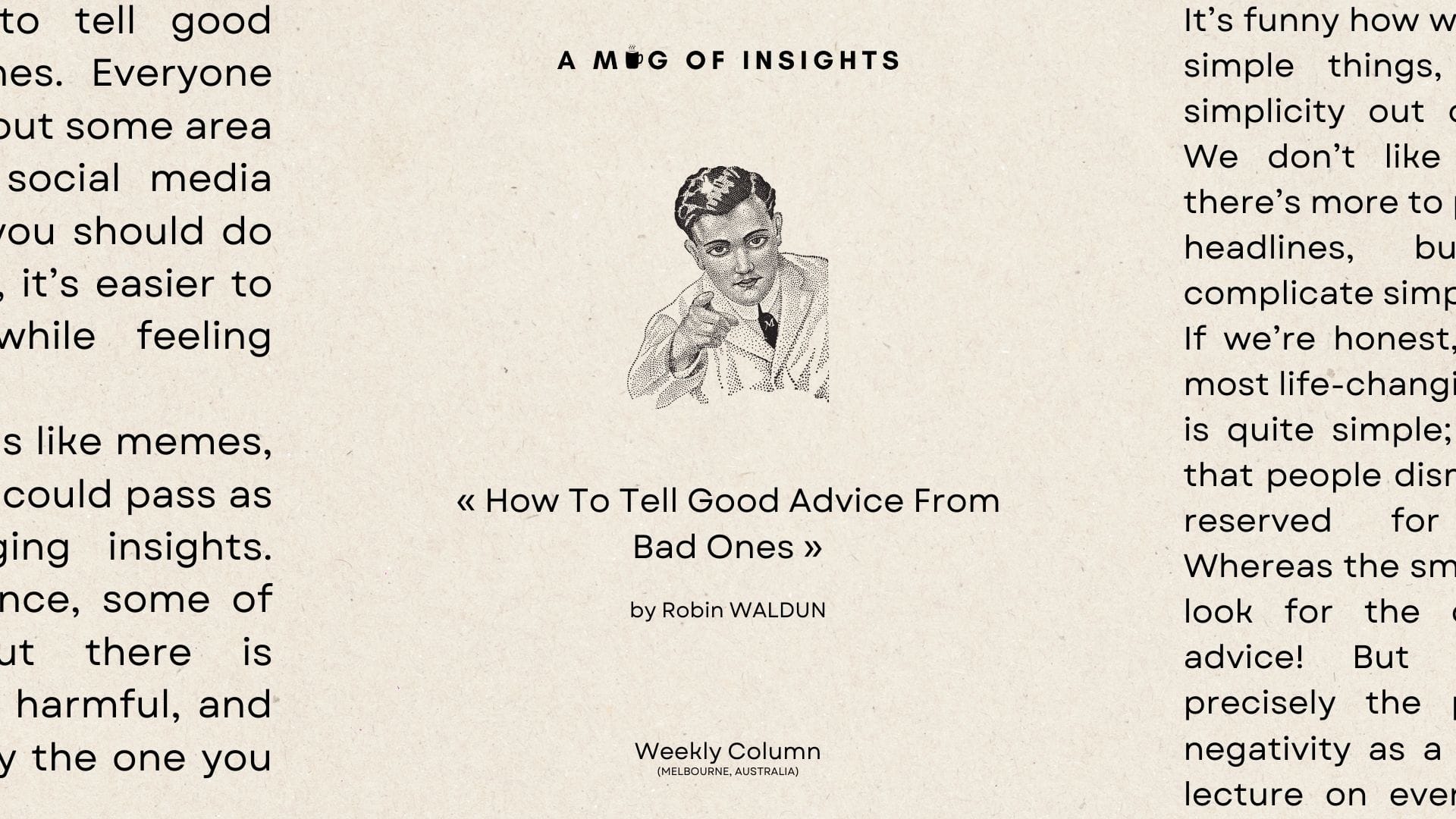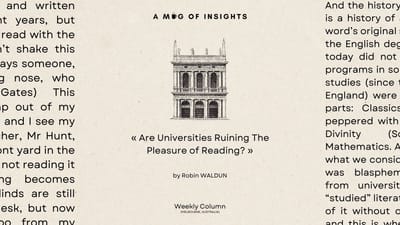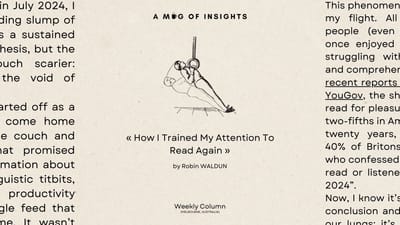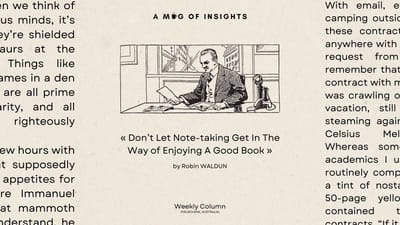How To Tell Good Advice From Bad Ones

Welcome to the weekly column from A Mug of Insights' new home! From now on, I'll dispatch these letters on Saturdays, and paid subscribers will receive their 1-2-Read letters on Mondays. If you like what you're reading, consider upgrading to the Grande tier for journal prompts and a practical exercise every week to strengthen your reading muscles! Thank you for reading, and I look forward to seeing you next week.
Nowadays, it’s tough to tell good advice from useless ones. Everyone has something to say about some area of your life, and with social media blasting you with what you should do every minute of the day, it’s easier to sit and do nothing while feeling paralysed.
Advice nowadays spreads like memes, and it feels like anything could pass as wisdom and life-changing insights. However, in my experience, some of the flashy advice out there is downright useless if not harmful, and the best advice is usually the one you would quickly overlook.
Today, I want to give you some pointers for distinguishing good advice from bad advice. Think of this as a bullshit radar that I’ve distilled from spending 8 years wandering into all kinds of dead ends, and hopefully you’ll save yourself dozens of wrong turns when you decide who to listen to in the future.
1: Good advice is simple
It’s funny how we love complicating simple things, while demanding simplicity out of complex things. We don’t like to entertain that there’s more to politics than instant headlines, but we’ll happily complicate simple advice.
If we’re honest, we’ll see that the most life-changing advice out there is quite simple; so simple, in fact, that people dismiss it as platitudes reserved for stupid people. Whereas the smart thing to do is to look for the difficult, Byzantine advice! But then, these are precisely the people who claim negativity as a virtue, who have a lecture on everything we do, yet still suffer from not making anything of themselves.
Bertrand Russell once wrote in The Conquest of Happiness that this aversion to simple, yet effective advice is not an accident. Because “undoubtedly there is some slight compensation in the feeling of superiority and insight which these sufferers have…” Complicating simple advice makes us feel superior, but it also comes at the cost of “the loss of simpler pleasures."
What these superior intellects fail to appreciate is that simple isn’t the same thing as easy. A stupidly simple advice: consistency is the key to sustainable growth, takes years to understand, decades to implement, and the smartypants can’t stand to fail at the feet of such pedestrian advice. So, they procrastinate by seeking out flashy theories, telling themselves they’re not ready as they look for quicker gimmicks.
Unfortunately, the marketplace of ideas has a way of catering for the perfect quick fixes for those unwilling to face simple and difficult truths. This is why we can read dozens of books and get nowhere, and implement elaborate productivity systems that eventually all crash and burn. We’re too distracted by complexity that we can no longer see what’s right in front of us: for a good piece of advice to work, we need to think about long-term shifts instead of short-term fixes.
2: Good advice is boring
All bad advice shares one thing in common: they promise that you’ll wake up as a different person tomorrow if you implement this one thing. This also extends into all efforts in marketing. If you drive this car, you’ll become a different person. If you buy this phone, your life will be transformed. And if you adopt this one technique, you’ll spring out of bed and start doing handstand push-ups.
But, even if we get the car, the phone and adopt the magical technique for handstand push-ups, we’ll still feel the same. The excitement wears off, and we’re still the same person, now just with an extra car to pay off, an extra phone to charge and another routine to maintain. They’re window dressing that tries to cover up a dirty window, whereas good advice gets to work and breaks out a cloth to wipe it clean.
This means that good advice works on who you are already, and at first, they will seem confronting, preachy and laborious to implement. A few weeks ago, I asked my Karate sensei how long it would take to get to a black belt. He slapped me back with: “If you can turn up every Thursday night, you’re already halfway there.” No bells and whistles, no fluff. Just turn up and pretend there is no other place to get to.
But if we take that advice to heart, turn up to the dojo, struggle with the basic moves while getting punched in the face by all the higher belts, we’ll eventually find our rewards in who we are already. Our form gets better. Our blocks are snappier, and we ended up with fewer bruises. This is progress we can see, and it shifts us from a quick-fix mindset to a mastery mindset.
And the magical thing is that eventually, we will get to where we want to go, but it’ll be a pleasant surprise. One day, you’ll wake up and life will feel pretty good. You start doing handstand push-ups without effort and run through all the basic moves. Only now, your basic moves will leave your older self in awe because, yes, you have turned into a different person, just not overnight. This is the power of boring and slow advice: it rewires who you are from the ground up instead of seducing you with gimmicks that’ll eventually wear off.
3: Good advice is constructive
This one is a lot more subtle but important: all bad advice negates, whereas good advice constructs.
We live in a culture of excessive critique. We despise this kind of person here while blaming that celebrity there, and this is where bad advice finds the easiest way in: you don’t want to be that kind of person, do you? Follow this [insert gimmick] and you’ll be better than most of them. To borrow and paraphrase a saying from Montaigne:
[negativity] is a coin the [bad teachers] conjure with so as not to reveal the [futility] of their [techniques], and which human [desperation] is keen to accept in payment.
But good advice, on the other hand, is constructive. It dares to dream of a better future and point you towards it, however naïve it might sound in the moment. It embraces the fact that change has to come from cutting through a clearing in untrodden terrain and draws its motivation from moving towards a vision instead of reacting against a past.
In a paper by Christopher Castiglia on the power of imagination & literature, he wrote that rather than giving into the suspicion towards imaginative futures,
“we might take it as an opportunity to imagine and acknowledge the idealism that [it] already animates.”
Good advice doesn’t just point us to a better future. It already animates the present as it begins the process of slowly changing us from the ground up.
Take these pointers with you, and whenever you encounter a piece of advice, ask: Is it simple? Is it boring? And does it animate my present already?
Until next week
Robin
Subscribe to my newsletter to get the latest updates and news




Member discussion